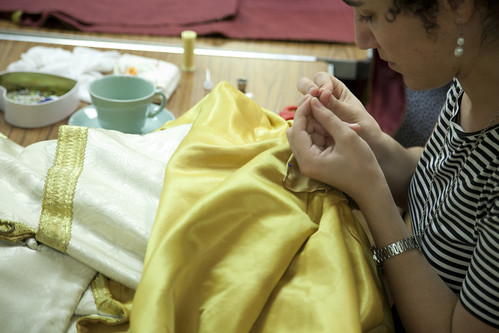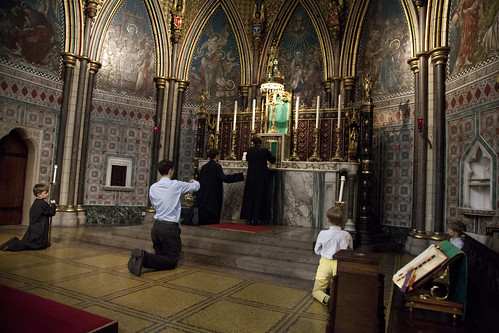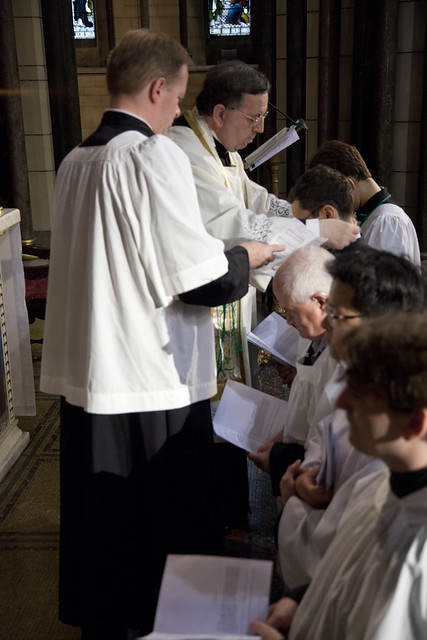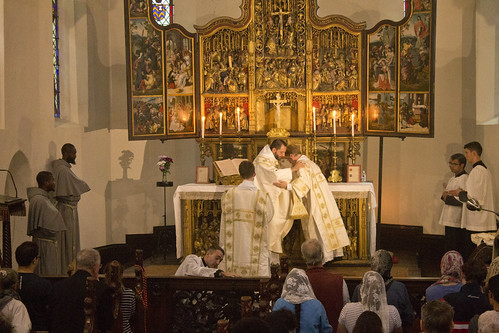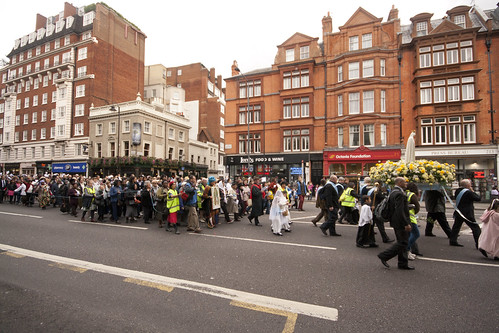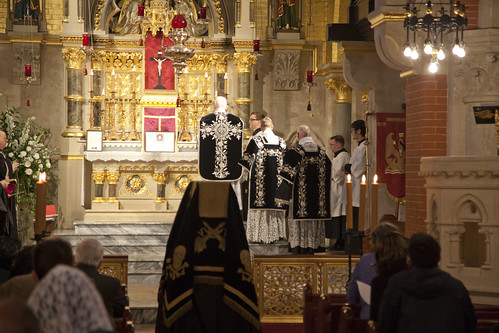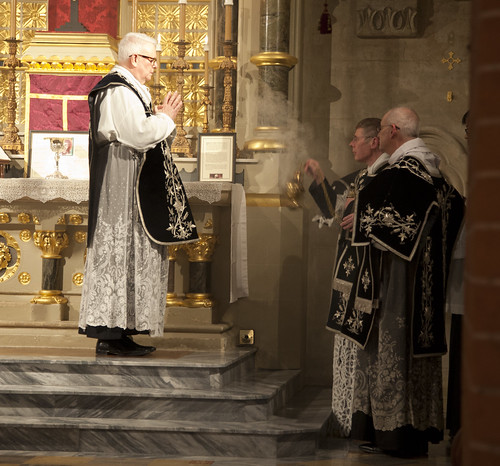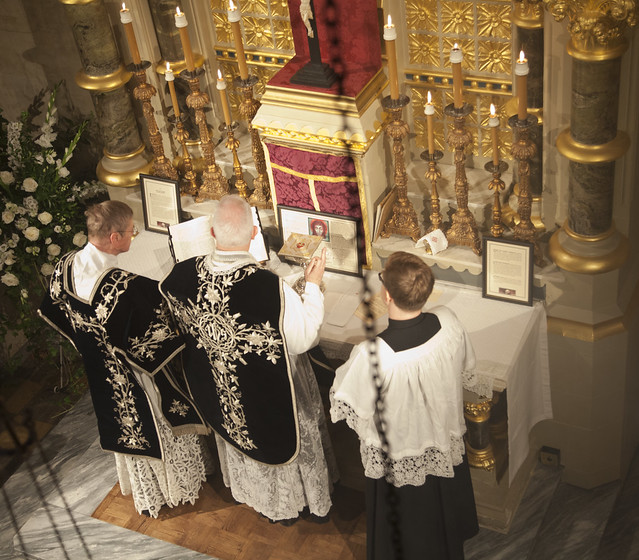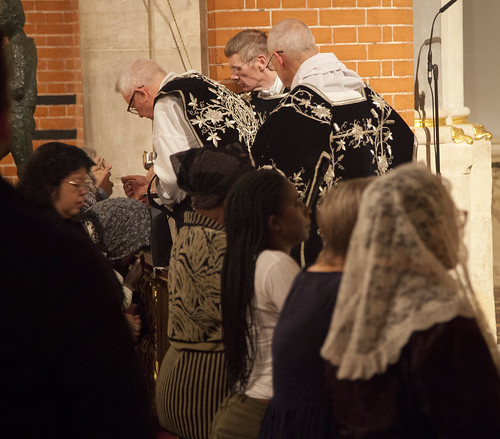Chairman's Blog
Server training and vestment mending at Spanish Place
Our activities at St James' Spanish Place were jolly affairs as usual on Saturday, and well attended. The Guild of St Clare vestment making and mending was in the basement, and the Society of St Tarcisius server training was in the church upstairs.
Fr Andrew Southwell, a priest of Southwark Archdiocese familiar from the St Catherine's Trust Summer School who has been in Rome doing studies but is currently in London, was able to enroll five new members of the Society of St Tarcisius, including a Senior MC, who is our MC at the Monday evening Masses in Corpus Christi Maiden Lane.
We have another such event booked, on Saturday 20th November: what you need to know is here (for servers) and here (for the vestment mending).
Support the Latin Mass Society
Who’d like to talk about Socrates?
Socratic Seminars: October 2021
I am returning to these after a break over the Summer. I have been doing them since January 2021 and have an established pattern, alternating different dialogues to discuss in a series of four seminars.
The idea is that these are open to anyone over 16, regardless of prior knowledge, and take place on line, for a modest fee. The early dialogues are works of real philosophical value but presented in a way designed (I imagine) to engage people without prior training: they are the training. These seminars have been satisfying for me and have engaged the interest of a range of participants: at any rate they tend to come back for more.
This round the following are on offer:
For beginners:
Series 2: Apology (on Socrates' mission), the Crito (on political obligation), Charmides (on temperance), and Hippias Minor (on voluntary wrongdoing).
Intermediate (for those who've done either or both of the introductory series of seminars 1 and 2):
Series 4: Protagoras (virtue and its teachability) and Gorgias (oratory and justice), each divided into two parts.
More advanced (for those who’ve done either or both of the intermediate series of seminars, 3 and 4):
Series 6: Symposium (on eros) and Parmenides (on the Forms), each divided into two parts.
I teach on Thursdays, we find a time convenient to each person in each seminar. Numbers between two plus plus me to five plus me.
I hope to start on Thursday 7th October.
Email me to register your interest. Joseph.shaw99 AT gmail.com
More information can be found here.
A Sacristan's Reflections on the Walsingham Pilgrimage
 |
| Charles Bradshaw assists Fr Henry Whisenant with the Blessing of Pilgrims |
Rosary Crusade of Reparation, London, 9th October
Please support this! Always a wonderful event.
Server training in London this Saturday: last call for bookings
This Saturday we are holding another Server Training day with the Society of St Tarcisius, in St James' Spanish Place, from 10:30am. We conclude at about 4pm.
25th September: St James' Spanish Place, London
(booking page) (info about the venue)
20th November: St James' Spanish Place, London
(booking page) (info about the venue)
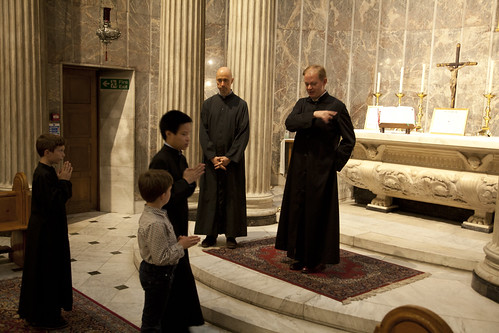
Support the Latin Mass Society
Videos from the Guild of St Clare
The Guild of St Clare is releasing a series of instructional videos about how to do simple repairs on vestments and a bit of domestic sewing--one episode to come will explain patching children's trousers.
This one explains how to thread a needle, and how to stitch down loose braid. Yes, pretty well anyone can do a simple thing like this, and with a bit of patience and practice, and the right advice, can do it to a decent standard.
LMS London events and Masses at Corpus Christi Maiden Lane
There is a lot going on in London once again, thanks be to God, and you can keep up with events through the LMS London monthly newsletter: see the most recent one here and subscribe here.
This Saturday there will be Server training and Vestment Mending in St James' Spanish Place. Book the server training, organised by the Society of St Tarcisius, here (and more info); email the Guild of St Clare (lucyashaw@gmail.com) if you'd like to join the vestment mending. Previous experience is not required! There is something that everyone can do, and there is masses of space and plenty of things to learn.
The challenge of a new school year
 |
| Quiz at a St Catherine's Trust Summer School a while back. We've not had the Summer School for two summers due to the pandemic. |
My first article in a new initiative, a weekly Digest (bulletin) from Voice of the Family.
Two recent news articles greeted the start of the academic year. The Irish Times informs us that official statistics confirm that since teacher assessments have in whole or in part replaced anonymised formal examinations, the relative performance of boys against girls has fallen. In the Daily Telegraph, Melanie McDonagh complains that her 14-year-old daughter’s Catholic school has brainwashed her into being a woke activist.
These are both troubling claims, and they may seem extreme, but the people making them are far from marginal. The problem of systemic bias against boys has been acknowledged by the Irish government, which is hardly a bastion of cultural conservatism. It was in fact established on the basis of world-wide statistics some years ago, in a study sponsored by the OECD. The creation of a generation of school-child activists all saying the same things about race and gender has been denounced by Professor Louise Richardson, Vice-Chancellor of Oxford University. Lest anyone imagine she is some conservative culture warrior, she recently made headlines apologising for Oxford’s education of the prominent Conservative Party politician Michael Gove.
Iota Unum talks in London are back: Jamie Bogle on 24th Sept
 |
| Fr Edward van den Bergh giving the last Iota Unum talk of 2019 |
After a long break necessitated by the epidemic, we are returning to our face-to-face talks in London.
The Latin Mass Society's 'Iota Unam' talks take place on Friday evenings in Our Lady of the Assumption Warwick Street (please enter by the back entrance into the basement: 24 Golden Square, W1F 9JR): click for a map.
Sept 24, James Bogle: Bl Charles of Austria
Oct 22, Joseph Shaw: Headship and Hierarchy in the Family
Nov 19, Dominic O’Sullivan: Spanish Integralism
Dec 10, Sebastian Morello: de Maistre on Liturgy and Politics
Jan 29: Tom Pink: 'The Papal Monarchy: the exercise of power in the Church, its theological and legal basis, and its limits'
Why priests should learn Latin
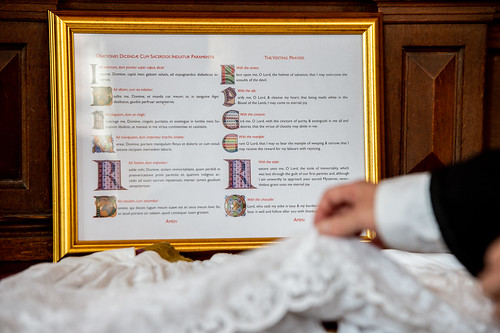 |
| Bilingual Vesting Prayers in the Sacristy of Westminster Cathedral |
There is an amusing video on YouTube showing an American Latinist engaging priests in the Vatican in spoken Latin. He remarks that he spoke to a dozen priests, but only three were brave enough to go on camera with him and use Latin in actual dialogue.
Spoken Latin might sound like the preserve of hobbyists, like spoken Elvish or Klingon, but being able to speak a language is the ultimate test of fluency, and for the Church, Latin isn’t just any other language. As well as being the sacred language of the liturgy, it is an indispensable key to the Church’s theology, history, law, philosophy, and poetry. As Pope Benedict XVI described it, it is the language the Church considers as her own.
It is for this reason that Latin has always formed an essential part of the education of the clergy. The Second Vatican Council’s decree on Priestly Training, Optatam Totius, says seminarians “are to acquire a knowledge of Latin which will enable them to understand and make use of the sources of so many sciences and of the documents of the Church” (13). This means a serious grasp of the language: being able to sit down and read St. Augustine, for example—not as a homework exercise, but because you want to know what he says about something.
Read the whole thing there.


